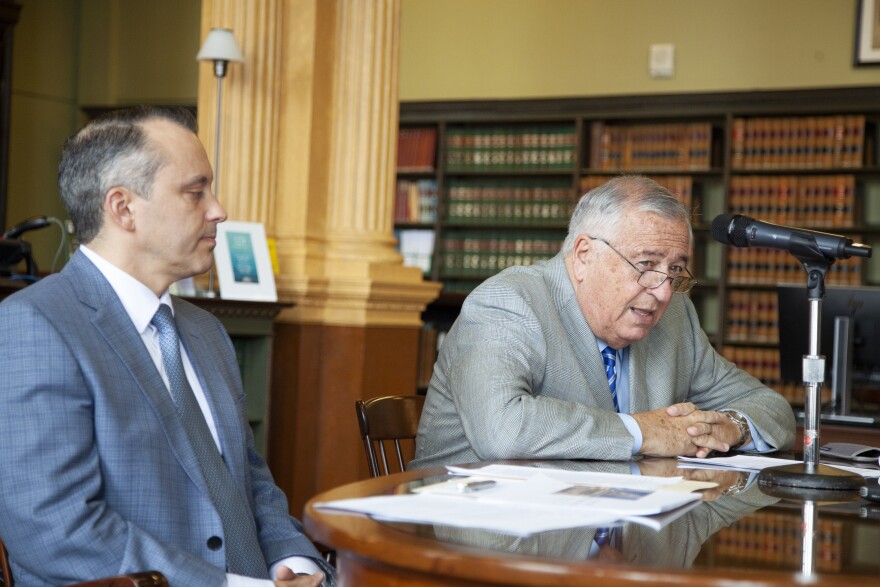Following a very quiet week on Beacon Hill, the Massachusetts House plans to dive right in. Representatives are focusing on that $56.2 billion budget this week, witht he fiscla year set to begin July 1.
Chris Lisinksi from the State House News Service explains the magnitude of the bill and what’s in store for lawmakers this week.
Chris Lisinski, State House News Service: This is obviously the biggest bill that happens every year just in terms of the sheer bottom line. The state budget funds everything across state government and really reflects a whole range of different policy priorities, even in the basic line items themselves.
We see things like how much state government thinks it should be investing in public housing subsidies, clean energy subsidies, how much money should go to state universities and UMass to help students bear the weight of rising tuition. So virtually everything you can think of is in some way touched by the state budget.
We're going to see several days of action in the House starting Monday. Usually these are pretty slow affairs on the floor, while lawmakers work in private to figure out which of the roughly 1,500 amendments they're going to approve and which ones are going to be left on the cutting room floor. This takes usually somewhere between two and four days to get a final version of the bill, whose bottom line is probably going to swell by at least a couple hundred million dollars.
Carrie Healy, NEPM: I want to dig into that budget a little more. As it has been presented to House lawmakers, the Ways and Means Committee wants to open up the state to more gambling. The budget includes this revenue line of $200 million from an online lottery. It's not an original idea, and this time it comes following fairly recent launches of sports wagering and mobile betting. So, Chris, what are House lawmakers hoping for with this "iLottery" proposal?
You're right to point to the recent launch of online sports betting, and that seems to be an actual point of argument from House lawmakers who are making the latest push to allow the lottery to sell products online. Their argument now is that the lottery can't compete with DraftKings and all sorts of other sports betting platforms that are available on your phone. If you can only do lottery products in-person, you’re going to the convenience store to get them. So, this is something that we could see approved.
I think the House's estimate is that the revenue generated would steer about $200 million toward early education and child care grants, which is a pretty sizable chunk of change if this wins approval. We know that Gov. Healey is on board. She came out in support of this idea for many of the same competitiveness with sports betting reasons that House Democrats have touted.
What we still don't know is if the Senate, which historically has been pretty cool to gambling, is also going to come around, especially so soon after the launch of sports betting.
So let's say the state opens up this so-called "iLottery." Will this be bringing in new revenue or is it likely to just shift around existing gambling money?
That's a really great question, and I think it's one that we don't have a firm, clear answer to. My best inclination is that lottery officials think it will be some combination of the two. That they can, you know, attract people who right now are doing sports betting, to lottery games instead, and attract people who are doing lottery games in-person to online platforms instead. So, there's going to be some shifting around of existing revenue streams.
But keep in mind, and this is a point that was raised several times at a recent committee hearing, money that's gambled on platforms like DraftKings goes to DraftKings. They pay a portion of that in tax revenue, but these are private for-profit companies that keep a lot of that money for themselves.
Money spent on the lottery, a much higher share of it goes into state coffers. So even if this captures already flowing money, backers are hopeful that it could still have a net positive financial impact.
And briefly, a jury last week unanimously decided that that huge (and paused) power transmission project in Maine called New England Clean Energy Connect can move forward in building out that corridor to bring Canadian hydropower to Massachusetts. The project obviously predates Gov. Maura Healey. But Chris, is it still essential to the state in order to meet some stated grid-greening goals?
It's certainly still a very important project to the state, but it probably doesn't seem as essential as it did back in 2016 when Massachusetts approved a clean energy law directing utilities to procure hydroelectric power, now that we are so much further along in the development of offshore wind, in particular.
But again, all of that's to say that this is not unimportant. The law called for about 1200 megawatts of hydroelectric power to be procured. That's as much as Commonwealth Wind, the largest offshore wind farm would generate itself.








